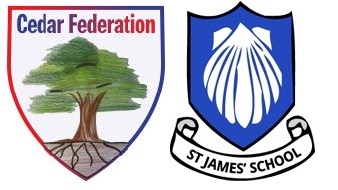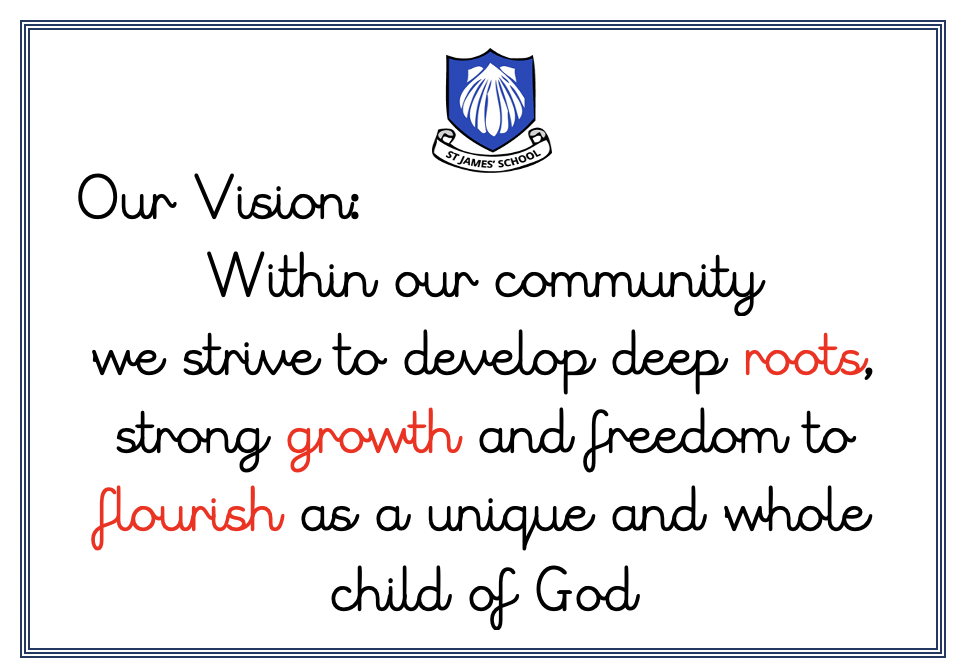Maths

At St James' CE Primary School we recognise that Mathematics is essential to everyday life, critical to science, technology and engineering, and necessary for financial literacy and most forms of employment. We want our children to become self-confident mathematicians. We aim to provide a high-quality mathematics education with a mastery approach so that all children:
- become fluent in the fundamentals of mathematics;
- reason mathematically;
- can solve problems by applying their mathematics.
(National Curriculum 2014)
Our maths curriculum provides broad and balanced opportunities which aim to drive a life-long love of learning as well as encouraging a positive learning attitude.

Maths is delivered through high quality teaching and learning and also through a concrete, pictorial and abstract approach to mathematics, where manipulatives play an important role.
At St. James' CE Primary School we use Enfield Local Authority Medium term plans (Years 1-6) and Development Matters (EYFS) to ensure full coverage of the National Curriculum. In addition to this the teachers are expected to use White Rose, NCTEM Mastery documents and Challenges for the More Able to ensure a mastery approach.
Teachers should:
- Ensure that all planning has the correct level of challenge for all children. This should include no more than 6‐8 calculations of the same type; any more is a waste of the children's learning opportunity as they have already proven their skill/knowledge. To ensure the children's continued progress within a lesson their newly acquired skill should be then shown in a different context, for example a worded problem.
- Ensure that weekly plans to be written on school format to meet the needs of the pupils in the class.
- Daily plans must have a clear learning objective and success criteria, which is measurable and achievable for all children.
- Maths must be taught so that there is a deep understanding not just so that the children know the procedure of how to carry out a calculation.
- Planning must contain practical opportunities for the children to demonstrate their understanding
- Within each strand of maths there must be opportunities for mastery and literacy, which will be recorded in the maths books.
- Each maths lesson must start with oral counting.
- Mastery is planned using the NCETM Mastery documents. These activities will be stuck into the books with a clear title and red stars to denote mastery.
- Writing opportunities must be given to all children. Examples of this could be planned after a practical activity to explain understanding; children can write a speech bubble possibly using a photograph of them working or maths stories.
- In the Early Years Foundation Stage (EYFS), we relate the mathematical aspects of the children's work to the Development Matters statements and the Early Learning Goals (ELG), as set out in the EYFS statutory framework. Mathematics development involves providing children with opportunities to practise and improve their skills in counting numbers, calculating simple addition and subtraction problems, and to describe shapes, spaces, and measures. The profile for Mathematics areas of learning are Number and Numerical pattern. We continually observe and assess children against these areas using their age-related objectives, and plan the next steps in their mathematical development through a topic-based curriculum
- There are opportunities for children to encounter Maths throughout the EYFS (both inside and outside) through both planned activities and the self-selection of easily accessible quality maths resources. When possible children’s interests are used to support delivering the mathematics curriculum.
- Regular assessment provides teachers with the tools to identify gaps in children’s learning and plan interventions that will target these.
CPD is available for staff during INSET at the beginning of the year and on an individual basis throughout the year.

At St. James, we have a child-centred approach which aims for our children to leave our school with a good understanding of a range of topics and be lifelong learners. They are able to transfer the skills that they have mastered in maths into wider contexts and are prepared for the next stages of their education. We hope that we have installed a love of all things maths and this will allow them to continue to broaden their knowledge and understanding.
Children’s skills and knowledge should be built upon year-on-year allowing them to master maths at their own level and continue to progress well in all areas of the subject.
We review learning and the impact of our teaching by evaluating pupil voice and tracking attainment and progress. We celebrate and share highly effective practice proven to have an impact upon the children’s learning. We continuously strive to improve the impact of the maths curriculum by highlighting areas of development so that the learning remains memorable and has an impact on the experience, skills and knowledge developed.

